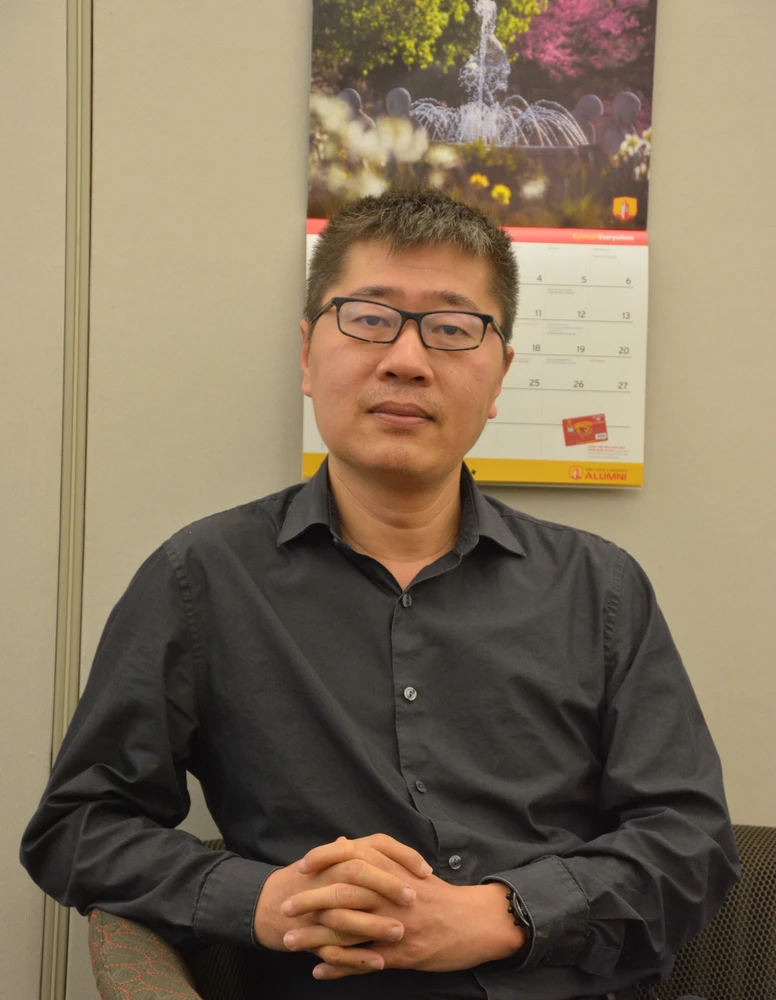
After wandering year after year, it's my time to go home.
Walking light-footed, I travel through the cold mountains.
At the ferry I ask for directions, but the boatman remains silent.
And I see the night stars floating in the autumn water.
经年流落归故里,
寒山走过脚步轻。
江津问渡无人语,
秋水浮来几夜星。
Tonglu Li received his Ph.D. from EALC in 2009. Currently he is Associate Professor of Chinese Studies in the Department of World Languages and Cultures at Iowa State University. His primary research area is 20th century Chinese literature and intellectual history, with a focus on the issues of enlightenment, nationalism, violence, and religious belief. He has published in such journals as Asia Major, CLEAR (Chinese Literature: Essays, Articles, Reviews), Concentric: Literary and Cultural Studies, Frontiers of Literary Studies in China, MCLC (Modern Chinese Literature and Culture), and Modern Language Quarterly, etc.
In addition to teaching and doing research, he has also developed a hobby in poetry writing, loosely based on the regulated forms of classical Chinese poetry. It is an intriguing experiment trying to catch the “poetic” with only twenty to fifty-six characters.
Born in China and working in the US., he initially considered to retain and enhance his linguistic sensitivity regarding Chinese through poetry writing in the challenging forms, but soon he expanded it into the creation of a non-pragmatic, aesthetic, and purely spiritual space away from the immediate reality. While it is essential to assume the necessary responsibilities and duties of a faculty member, he enjoys his writing that has nothing to do with refereed publication, promotion and tenure, or self-promotion. With poetry writing free from anxiety and pressure, he can indulge in contemplating the natural scenery of the Midwest or anything interesting he encounters, and transform his ideas into poetic form, and share it with friends on social media, mainly on WeChat friends circle and Facebook, regardless of how much traffic it attracts. To him, it is a genuine moment of writing for writing’s sake.
Poetry writing also gives him an opportunity to counterbalance the rational, analytical, and logical language styles of academic writing with a style that resorts to the affect, the imagery, and the sensitivity. While the former is indispensable for many reasons, the latter provides the potential for him to create rich and enjoyable texts rooted life experiences. Further, through poetry writing he understands better the great literary texts he works on and becomes cautious trying not to fit literary texts into any existing theoretical framework, be it psychoanalysis, deconstruction, or Marxism. Lu Xun is not the Chinese version of Lacan or Derrida, and perhaps he will never be one. Go back to the contexts, demonstrate more respect to the texts, and enjoy their ambiguity and indecisiveness.
The ad hoc activity of his poetry writing, which started from his years in Illinois, partially under the inspiration of the classes taught by Professors Zong-qi Cai and Rania Huntington, nowadays happens on his way from the parking lot to his office, or at any random moment in life. It gradually led him to think about such fundamental questions as what it means for a text to be “poetic”, or how a tradition comes into being. There aren’t and will never be definite answers to these questions considering the linguistic and cultural differences among the cultures, However, questions like this have led him onto a pilgrimage along the great poetic traditions around the world and across time.